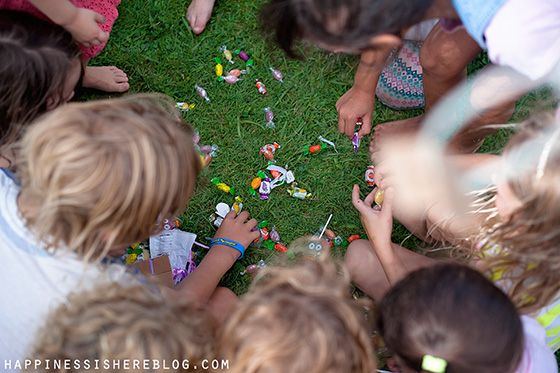
You Can’t Teach Manners by Being Rude

Picture this. You’re out at a cafe, having a great time with friends and family, you go to order your lunch and as you finish reading your choice of dish from the menu your partner leans in and says pointedly in your ear, “and did you say please to the waitress?”, reminding you to use your manners.
How rude! I mean, do they think you’re a child or something?
It would be absurd right. Because we reserve that kind of treatment for children. We are free to be rude to them, in the name of teaching them ‘manners’.
That’s right, we use rudeness to teach manners. It’s really quite laughable.
I’m not sure who came up with this ridiculous idea, but it’s certainly time for a rethink.
It seems like adults get so caught up in trying to force children to be respectful and polite, that they forget that the example they are setting is not exactly encouraging either of those things.
Ultimately, you can’t control another person. Maybe they’ll say ‘please’ and ‘thank you’ at the appropriate times to avoid your disapproval and judgement, but will they mean it? Will it come from the heart? Unlikely. It makes much more sense (and is way more effective) to model the choices and values that are important to you. You want people to speak to you respectfully and politely? Then you need to do the same.
If anyone needs a refresher on what manners look like, I think it might be adults…
12 Manners That ADULTS Need to Practice

1. Say thank you
Sometimes I think we’ve ditched good manners in place of ‘positive reinforcement’. Everyone’s so concerned with controlling kids through praise that you’re more likely to hear a ‘good girl/boy’ than a genuine heartfelt ‘thanks’. But you know what’s more meaningful? You guessed it, the thank you! Just appreciate them! That’s not only the most respectful and polite thing to do, but the best way to model good manners anyway. Thank your kids! Ditch the praise.
2. Apologise
So many people are forcing insincere apology’s out of their kids but don’t say sorry themselves when they’ve done something wrong. Again, the best way to encourage things you value is to actually model them yourself. When you make a mistake, apologise. Children deserve that. They are people.
3. Don’t touch their stuff

You don’t touch someone’s possessions without their permission. Children are included in that. You don’t cull their toys, confiscate things, rearrange their room, or otherwise make decisions about the things that belong to them without their permission. Children have the right to own things. You want them to respect your belongings? Respect theirs.
4. Listen when they talk
When someone talks to you, the polite thing to do is listen. If you want to be listened to, listen to others.
5. Don’t laugh at them
It’s not polite to laugh at someone, or make fun of them. Age doesn’t change that.
6. Be mindful and tolerant

Kids in public get such a hard time. I have literally seen adults walk purposely in a straight line expecting children to jump out of their way as if they are some kind of inferior being. I mean what are you doing people? Maybe it’s because they were so disrespected as children that they enjoy the feeling of power they never had. Whatever the reason, it’s rude. As are nasty looks and exaggerated sighs at children enjoying themselves in any public space. If they’re not hurting you or damaging things then maybe try lightening up a bit. It’s absurd to think children should have more ‘manners’ while you are free to be rude and condescending.
7. Reply when they talk to you
Answer their questions, listen to their thoughts, consider their opinions, like you would with anyone else. If you’re unable to do that at that moment, just kindly explain.

8. Be respectful
Many adults appear to think that they have earned automatic respect on the basis of their age, no matter how they behave. It doesn’t work that way. Yes you deserve to be treated respectfully, but I don’t think you can expect to be if you’re not going to extend the same courtesy to others. Children deserve the same rights and respect as adults.
9. Don’t gossip
Talking negatively about people (especially in front of them) is not polite. Same goes for children. Don’t tell stories about them that may embarrass them. Don’t complain about them. Sharing your struggles and feelings to a friend in private is quite different to opening talking about them and putting them down in front of others.
10. Respect autonomy

Don’t touch them without asking. Whether it’s to pick them up, wipe their nose, hug them, tickle them, or the many other things people do to children without their permission. It’s rude and inappropriate to touch someone without their consent.
Don’t tell them how to dress, when to sleep, when to eat, how to have their hair, or anything else relating to their own body! You wouldn’t say that to an adult. Yes, it’s your job as a parent to keep them safe and healthy, but you can do that without overriding autonomy. Read more here.
11. Seek their opinion
If you had a friend visiting you, would you make decisions about what you were going to do that day without their input? Would you tell them it was time to leave without notice and insist they stop what they were doing because you had other plans? No. Extend the same courtesy to the children in your life.
12. Don’t dismiss feelings
When an adult is upset you wouldn’t dream of telling them to stop crying, that it’s not that bad, and that they have no reason to be upset. Just because children are still learning to regulate their emotions and might feel them more intensely, doesn’t mean they are any less valid. It is never appropriate to tell someone to stop crying or feeling however they are feeling. The right response to emotion is always empathy.

“Children learn more from what you are than what you teach.”- W.E.B. DuBois
Children are people, who deserve the same respect as adults. They are also great learners and imitators. What are you modeling for them?







Comments
I had a dad of a 3 year girl old swoop in on his daughter and demand she apologize to my toddler. It was totally unnecessary and at worst a misunderstanding. After I wouldn’t comply to this staged politeness moment, he began lecturing me about “our responsibilities as parents to teach them manners”. It was completely uncomfortable for everyone. His daughter quietly rebelled by refusing to apologize. My toddler was baffled and I was just disappointed.
Thanks for the excellent reminders. The one that struck me though was number six. I had no idea the walking straight towards kids thing was universal. The kids and I have run into it a number of times out in public, but it never occurred to me it was more widespread. The end result here has been a few adults being told, by me, that they could just as easily move. Thanks for the additional perspective!
Thank you for this, i love reading it and trying to capture it all into our lives.
Wow. A lot of this is a bunch of leniently, passive, baloney! Don’t touch, cull, or otherwise bother their things? Ummmm…no. Take a civics class to learn about the balance of rights and responsibilities. And the difference between a right and a privilege.
I have the right, and privilege, of driving. It is my responsibility to drive safely and sober. Should I give up that responsibility, the government can revoke my right/privilege.
The children have the PRIVILEGE of having things in their possession, just as we adults do, and so they have responsibility, just as we adults do. I can lose my THINGS if I misbehave; and so can they.
Yeah the whole point is don’t act like the government. Be a kind parent.
I appreciate the message behind this – to respect children now, to recognise their own way of learning and navigating the world, not only once they have grown up. After all, some do not make it to adulthood. However, we don’t always get it right with adults!
And I do also see that children need some different rights to adults. It would be unwise to allow them to travel the world alone, for example. Only desperate situations lead to this and then it has to happen anyway.
Don’t yell at ADULTS by writing to them in all caps. My God tells me (yes He actually gives commands) to train up a child in the way they should go. I went to university and was taught not just by actions but words. Lectures were reinforced by labs, but I did learn by lectures. When children see you modeling polite behavior it should only reinforce what you’ve taught them verbally. It’s not a replacement. It doesn’t matter if they mean it (another phrase for feel it). We live in a feel good culture. If it feels good do it, if it doesn’t don’t. No, if it’s right do it. As an adult I know right from wrong because it was taught to me as a child. I dial
didn’t always understand it or like it. As an adult I have to do things I don’t like and guess who prepared me for it, parents who didn’t always let me have my way.
Isn’t this whole article a list of do’s and don’ts for adults? How do you get that right if I can’t even tell my own child what to do? What makes a child more important than an adult?
Leading by example is a very important and underestimated aspect of parenting, but it also shouldn’t be the ONLY aspect of parenting. An 8 year old doesn’t have an idea of the correct amount of sleep or the correct times to eat based on their schedule. When to eat, when to sleep, how to dress, these are things that parents can’t model by example easily because kids have different needs. Also, confiscation is legitimate. If your child is misusing something you give them, forced moderation or confiscation with explanation makes up for the impulse control that their brains haven’t developed yet. I think there’s a balance to be struck between letting your children find their own path and actively teaching them the right way to live. Show them how to be mindful and respectful through your actions, but also tell them directly how to do so when it’s clear that they don’t understand or are actively bring disrespectful to others.